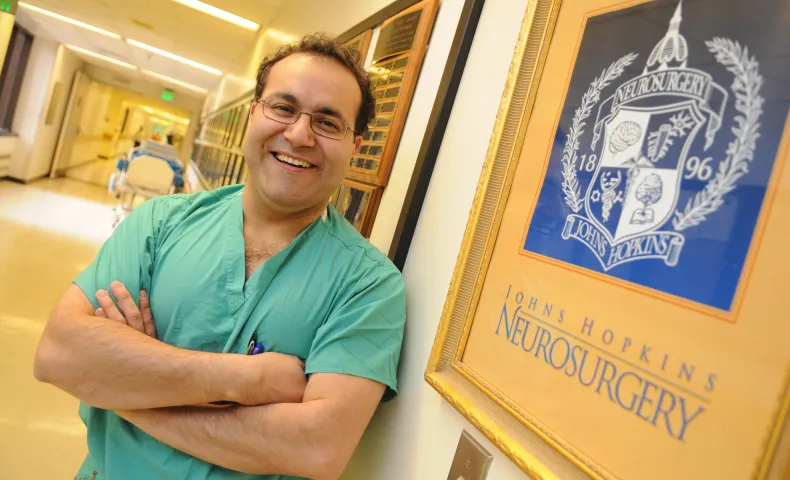
Alfredo Quiñones-Hinojosa
Alfredo Quiñones-Hinojosa is a neurosurgeon and associate professor at the Johns Hopkins University School of Medicine in Baltimore, Maryland. Known as “Dr. Q.” by his students and friends, Alfredo performs more than 250 brain surgeries each year, directs a world-class research laboratory, and has been the focus of numerous media profiles and interviews. Alfredo came to the United States as an undocumented immigrant when he was nineteen years old. He spoke to us of the years he spent building a better life for himself and his family in this country, a journey that took him from the farm fields of the San Joaquin Valley to Harvard Medical School.
I Came Here with a Dream
Most people think poor immigrants like myself come to America because we think it’s an automatic ticket to a better life. They think, “Oh, you came here because you wanted to have an easier life.” I think that is wrong. Most immigrants who come here know that life in the United States is hard, but they see this country as a place where, if you work hard, you’ll be able to put support your family. And think of all the things we leave behind—our families, our friends, our roots—to come into a new culture and a new country that doesn’t necessarily welcome us. Yet we’re willing to take that risk and leave everything.
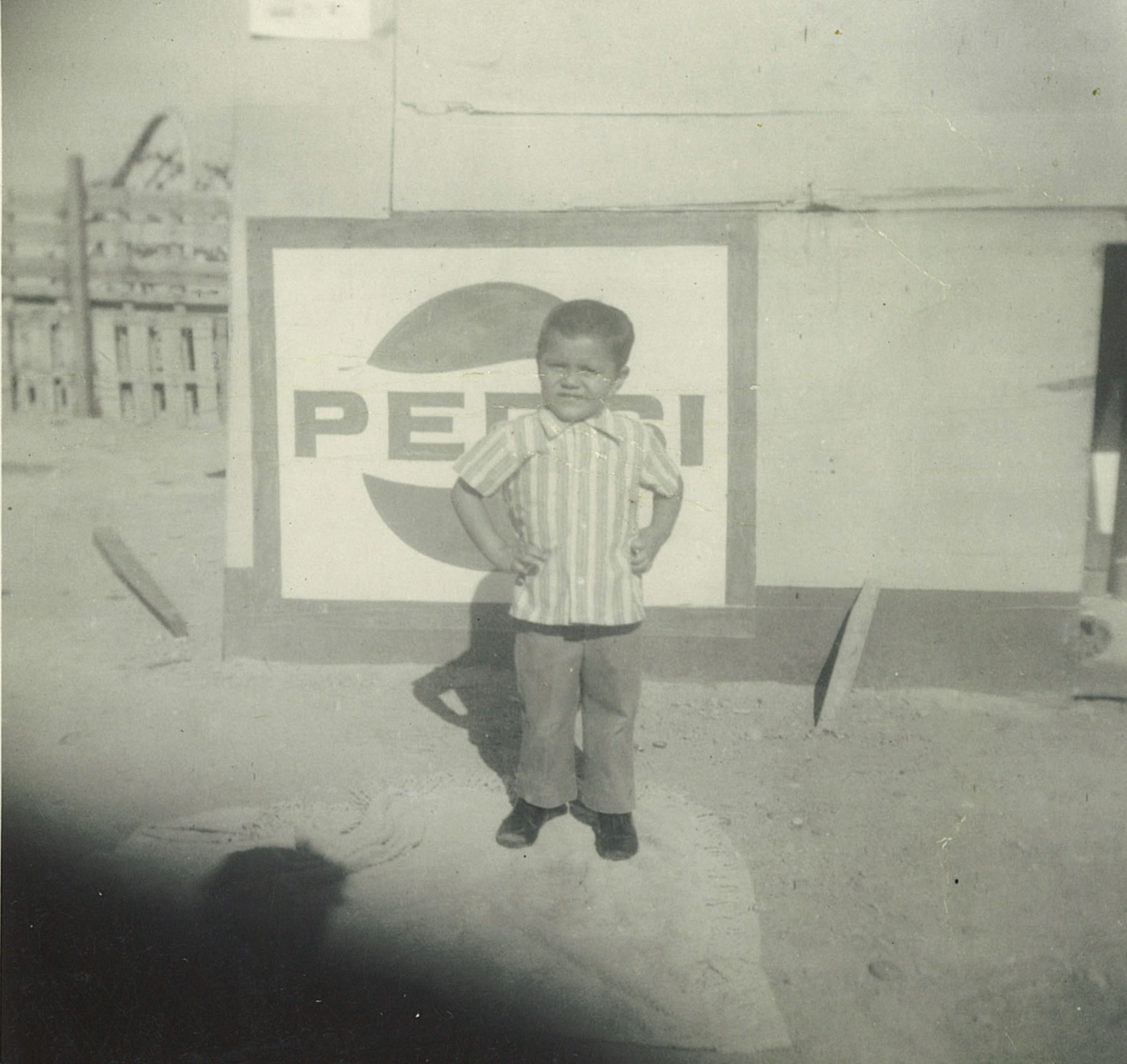
I had just turned nineteen when I came to this country. I hopped the fence between Mexicali and Calexico, with literally nothing in my pockets. At this time, America for me was the land of opportunity. It represented a dream of one day being able to say, “I have contributed something to this world.” It was a place where I could potentially earn enough money to be able to eat, to be able to put shoes on my feet, to be able to buy a house one day, to be able to one day give my own children the opportunity and the education that I didn’t have in my own country. And I knew from the start that achieving all of this meant working hard and using my intellect to the best of my abilities.
At this time, America for me was the land of opportunity. It represented a dream of one day being able to say, “I have contributed something to this world.”
I came here with the idea that I would one day go back to my own country. But then I started enjoying the United States, and I began to see that the opportunities here weren’t a dream—they were very real if you worked hard. I matured in this country as this country began to mature in my heart as well. And so I never went back to Mexico. I wanted to stay in America and create a legacy I could leave to my children; I also felt I could leave a legacy for the world.
Alfredo worked alongside other undocumented immigrants on a 10,000-acre farm in the San Joaquin Valley. He started off picking tomatoes, cauliflower, corn and grapes, and was later tapped to operate and service tractors and other heavy equipment on the farm. Alfredo and his coworkers made just $150 a week in jobs that few Americans would fill.
The Incredible Difficulties of a Better Life
Working in the fields is a wonderful, honorable profession. It breaks my heart that people think less of these workers. People don’t realize how unwelcome immigrants can be in this country. Not only do they leave everything behind, but they also face great difficulties here in America when they come.
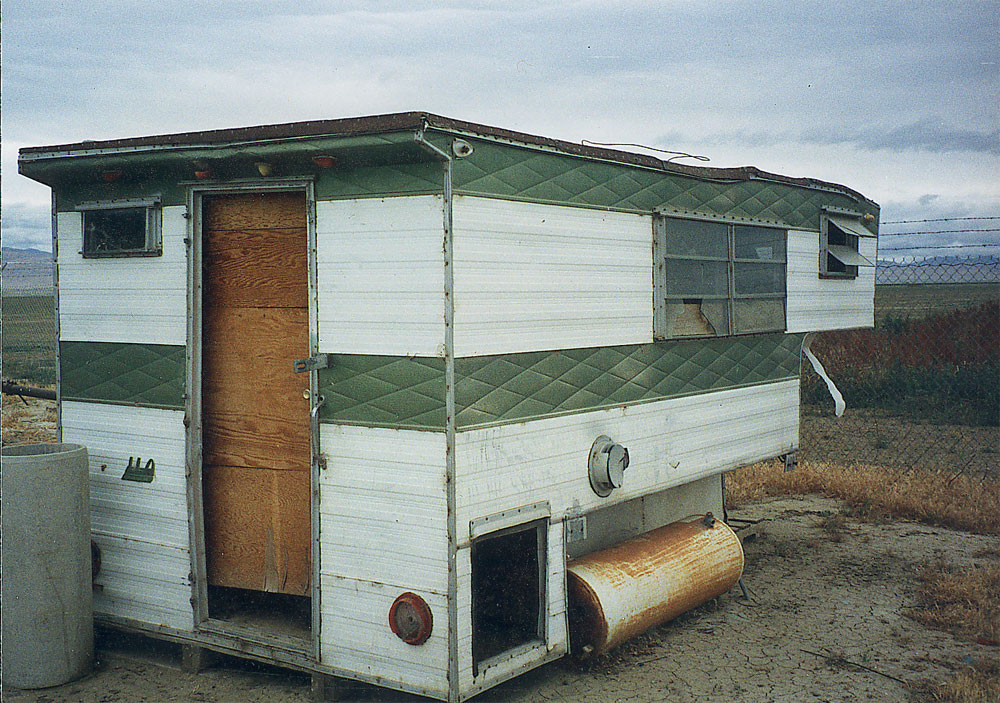
Being an undocumented immigrant, it’s almost like not having a voice, not having a face. People walk right next to you, and it’s almost as if you’re invisible. And there is no support, there’s no understanding. You are just hired help. In many ways, many people don’t understand your culture. They don’t understand what it’s like to live in the middle of the fields with no running water, no shower, no toilet to use. And most people don’t realize that just like them, we are humans. We have dreams, aspirations. Every day, we wake up in the morning and we take a breath just like everybody else. We’re no different.
Being an undocumented immigrant, it’s almost like not having a voice, not having a face. People walk right next to you, and it’s almost as if you’re invisible. And most people don’t realize that just like them, we are humans. We have dreams, aspirations. Every day, we wake up in the morning and we take a breath just like everybody else. We’re no different.
A Laborious Path to Citizenship
Coming from Mexico, I had a lot of relatives all over the San Joaquin Valley. My parents and siblings were migrant farm workers who had previously come to the U.S. several times and worked in the fields. And right around that time, there was legislation* in California that said if you were a migrant farm worker for a certain amount of time during a certain period, you could actually qualify for work authorization. And that’s exactly how they found their way and their path into the United States.
I didn’t have that luxury because I was underage. But by the time I was eighteen, I had an opportunity to do something similar, where I could demonstrate that I had worked in the fields for a few months, and that’s how I ended up gaining a work authorization of my own.
So because of working in the fields, what appeared at first to be a difficult and a tough sort of situation ended up becoming a blessing for myself and for my parents and my siblings. We ended up being able to stay in the United States with work authorizations. And that eventually led to permanent residency and ultimately citizenship by the time I was at Harvard in medical school.
From the Fields to U.C. Berkeley
After several months of working in the fields, I realized that there was nothing else for me to do in this place. I felt there were no further challenges for me, you know what I mean? So one day I told a relative of mine that I wanted to learn English and potentially go to school. And he just told me, “What are you talking about? You’re going to spend the rest of your life here, working in the fields just like the rest of us.”
I felt as if someone had just stabbed me in the heart. No one thought I was going to do anything. All they saw was that young kid who couldn’t speak the language. That’s sad. That’s probably how we view a lot of immigrants who come from humble backgrounds.
I was so upset that I left immediately the next day and moved to Stockton, a small town in Northern California. A few days after I got there, I began working on a railroad. I started with the most menial job you can imagine, and ended up a couple of years later as a foreman on the graveyard shift.
By 1991, I was at the University of California, Berkeley. This was just a couple of years after I left the fields. That’s how quickly things were moving.
While I was working on the railroad, I started learning English in a community college. And that’s how my life began to shape up in the United States. At the community college, a teacher took me under his wing, and I began to have my eyes opened to the American dream even more. I began to see what education can do for you, and I realized that I wanted to get an education even more. By 1991, I was at the University of California, Berkeley. This was just a couple of years after I left the fields. That’s how quickly things were moving.
While at Berkeley between 1991 and 1994, Alfredo stood out as a particularly hard-working student.
Making a Mark in a Big School
In 1991, I enrolled at Berkeley as an undergraduate. I spent three years there. While I was going to school full-time, I was also working two or three jobs. I had a job as a teacher’s assistant in physics, calculus and chemistry, I worked in the lab, and I worked in a store on the weekends. I got very little sleep, but I was all charged up with energy. I mean, I was hyperactive! My friends would ask me, “What kind of drugs are you taking?” because I was just so full of energy and so focused.
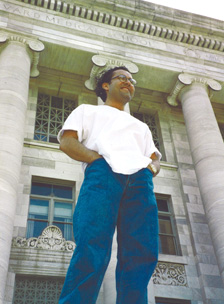
And I honestly don’t know why it was. I think that at this point in my life, I really saw myself as a potential underdog, and I knew that it was going to take much more than just good luck in order for me to be successful in this country.
Berkeley is a big public school, and if you don’t do your best, you get lost in the middle. And so I ended up getting more and more focused, full of energy, working hard. I went beyond just doing my best. And little did I know, I was putting together an incredible academic record, with all of my jobs and everything that I was doing at school.
I didn’t know that I was going to go into medical school until my last year at Berkeley. I was studying psychology. I was challenging myself because a lot of the psychology exams were essays and writing, and I knew I needed to become a better communicator, both written and oral. In order to keep my GPA high, I would also take the science classes. A lot of the science classes are universal, so you don’t have to know English very well. And I didn’t know it at the time but because of the science classes, I was accumulating classes that were going to be sufficient to get into medical school one day.
The Next Big Step: Harvard Medical School
In 1993, a professor at Berkeley, after looking over Alfredo’s transcript, suggested that he apply to Harvard Medical School. Alfredo was accepted, and he moved east in the fall of 1994. By the second year of medical school, he was considering neurosurgery as a career. After graduating from Harvard, he received a Howard Hughes Medical Institute fellowship to study at the University of California, San Francisco.
I often look back and wonder how I ended up in medical school. And I always look deep down in my past to what made me happy, and certainly working with people made me happy. I also look at my pedigree. My grandmother was a curandera, a town healer, and a midwife as well. And I look deep down in my heart, and I realize that there was something about being able to help others that was interesting to me and ingrained in me. And not fully knowing what I was getting myself into, I decided that I was going to go to medical school.
It was chance and good luck, some people may say. And good luck does not come to those who want it. It comes to those who look for it, you know what I mean? So it was a combination of everything coming together to get me to medical school.
“You’re Too Nice to Be a Brain Surgeon”
The very first time I told two of my best friends at Harvard that I wanted to be a brain surgeon, they thought I was crazy. I was a second-year medical student at the time, and I was doing research in neuroscience. I was interested in the brain, and in doing things with my hands. My friends looked at me and said, “Are you crazy? Brain surgeons are the most elite doctors there are. They come from a long pedigree. They’re also very arrogant, so you wouldn’t fit. You’re too nice of a guy.” They didn’t really know that I was kind of arrogant myself, but that’s okay. “You’re too nice of a guy,” they said to me. “And you’re crazy.”
Well, I went on to do my third year of medical school, and once again I found myself at the right place at the right time. I ended up in an operating room seeing a craniotomy. That’s the surgery that happens when someone is awake and the surgeon takes a brain tumor out. And I said to myself, “Oh, my god. This is what I want to do.” I knew that I would have to work very hard, but that I could be successful at this.
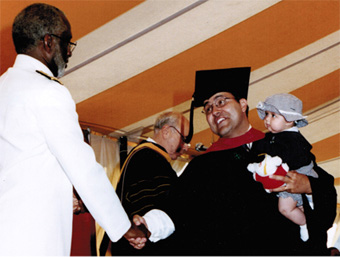
So I went to Harvard for four years, and then I did a research year with Howard Hughes. And that’s when I started getting even more into research.
Alfredo’s surgical work today focuses on the treatment of brain tumors, with an emphasis on motor and speech mapping during surgery. He also leads numerous research efforts on the role of stem cells in the origin of brain tumors and the potential role that stem cells can play in fighting brain cancer and regaining neurological function. Alfredo lives with his wife, Anna, and three children in the Baltimore area.
250 Surgeries a Year
A lot of my life today is research. It’s very heavy, very sophisticated work funded by the National Institutes of Health. That means that you funded it: you and me. I like to think that the people of the United States believe in what I’m doing, and I always want to make sure that the government and the American people are given the credit they deserve for my success.
The research is really the most exciting part of what I do; I’m not only trying to save lives in the operating room. The research we are doing with this tissue is to try and find out whether or not there are stem cells within brain cancer—stem cells that are going crazy, stem cells that cannot regulate their own growth, and are therefore killing patients. That’s my research.
On top of that I do 250 brain tumor surgeries a year. A lot of those patients end up donating tissue to the lab, so my operating room is an extension of my laboratory, in many ways. This tissue would go otherwise to the garbage, but we actually use the resources we have instead of letting them go to waste. It’s like living in a third-world country. I use everything that I can to learn. In many ways, my patients are part of history already.
What the Fields Gave Me
Nowadays, people ask me, “Why do you work so hard?” And I always tell them, “Well, first of all, I do work hard physically, but that’s not what really gets to me nowadays, to be honest with you. It’s not the physical work because I know what hard physical work is all about. I’ve done it.”
What gets to me is the emotional side—dealing with patients with brain cancer, dealing with the stress of the high liability of what I do, having people’s lives in my hands every day and multitasking in a large laboratory.
But the physical stuff, that doesn’t get to me. I have worked much harder physically. That’s what the fields gave me, the ability to appreciate the beauty of our country from a different angle. So when I see patients who are struggling economically, when they feel disenfranchised, I can relate to them. I say, “I’ve been there, and I know what you’re going through right now, so we’re going to work this out. So you have no money to pay for this. We’re going to sort it out one way or another.” That’s what allows me to connect. Those early experiences in the United States, of being on the other side of the railroad, have allowed me to transition and become even more efficient and a much better communicator in what I do today.
America and My Role In It
It took me a while to get where I am today, but I never lost hope, I never lost my love for this country. Despite the fact that the American dream is getting more difficult for other immigrants, I still think it is obtainable. Despite all the political things going on right now, I still believe in that same dream that I had back then, when I came in the late 1980s as a young kid and I came in and I worked in the fields with the same enthusiasm for this country, the same love for life.
America for me is still the land of opportunity, the most beautiful, wonderful country. And my role now is to make it even better.
I definitely feel very lucky that doors were opened for me. But it’s not all about luck, it’s not all about me. I found great mentors after I left the fields. And I had all these wonderful opportunities that came to me because of institutions like U.C. Berkeley and Harvard and the U.S. government. It was the immigration reform under Ronald Reagan that allowed me to work my way toward becoming a citizen. And it was at a community college where I was able to start learning English and start finding my place in this country. And then at Berkeley I was able to get an affordable education and graduate.
Still the Same Person, Seen Differently
I always want to emphasize the positive, but the negative side is that, as I look back, I feel that no one cared for someone like me. It was not until I started going to college, certainly by the time I was at Harvard, that people began to pay attention to who I was. But I was the same guy that I was when I was nineteen years old. Even though I am twenty-plus years older now, I am still the same kid that I was back then. Nothing changed, yet people see me with different eyes nowadays. That to me is sad. So that’s what it’s like to be on the other side, to not have a voice, to not be recognized.
I always want to emphasize the positive, but the negative side is that, as I look back, I feel that no one cared for someone like me. It was not until I started going to college, certainly by the time I was at Harvard, that people began to pay attention to who I was. But I was the same guy.
I have relatives who are still working the fields in the San Joaquin Valley. Every now and then I will have a letter or phone call from them, and they can’t believe where I am today. They see me in the news, they see me on television, and they are still there. They are the workers no one sees, but they are carrying our country.
Creating Opportunities and Pathways for Immigrants to Contribute
I know what it takes to achieve the American dream; it’s a combination of believing in yourself and of also having other people and institutions believe in you. It takes hard work, perseverance, respect and excitement. But there also have to be opportunities for people to get an education and contribute. If you ask me what kind of policies we need in this country, I don’t have any answers for that, to be honest with you. I just know what’s happened to me, and I know there is an interaction between the responsibility of immigrants to find their own luck and the availability of opportunities for them to do so.
Dr. Quiñones’ book, Becoming Dr. Q: My Journey from Migrant Farm Worker to Brain Surgeon, was published by UC Press in 2011.